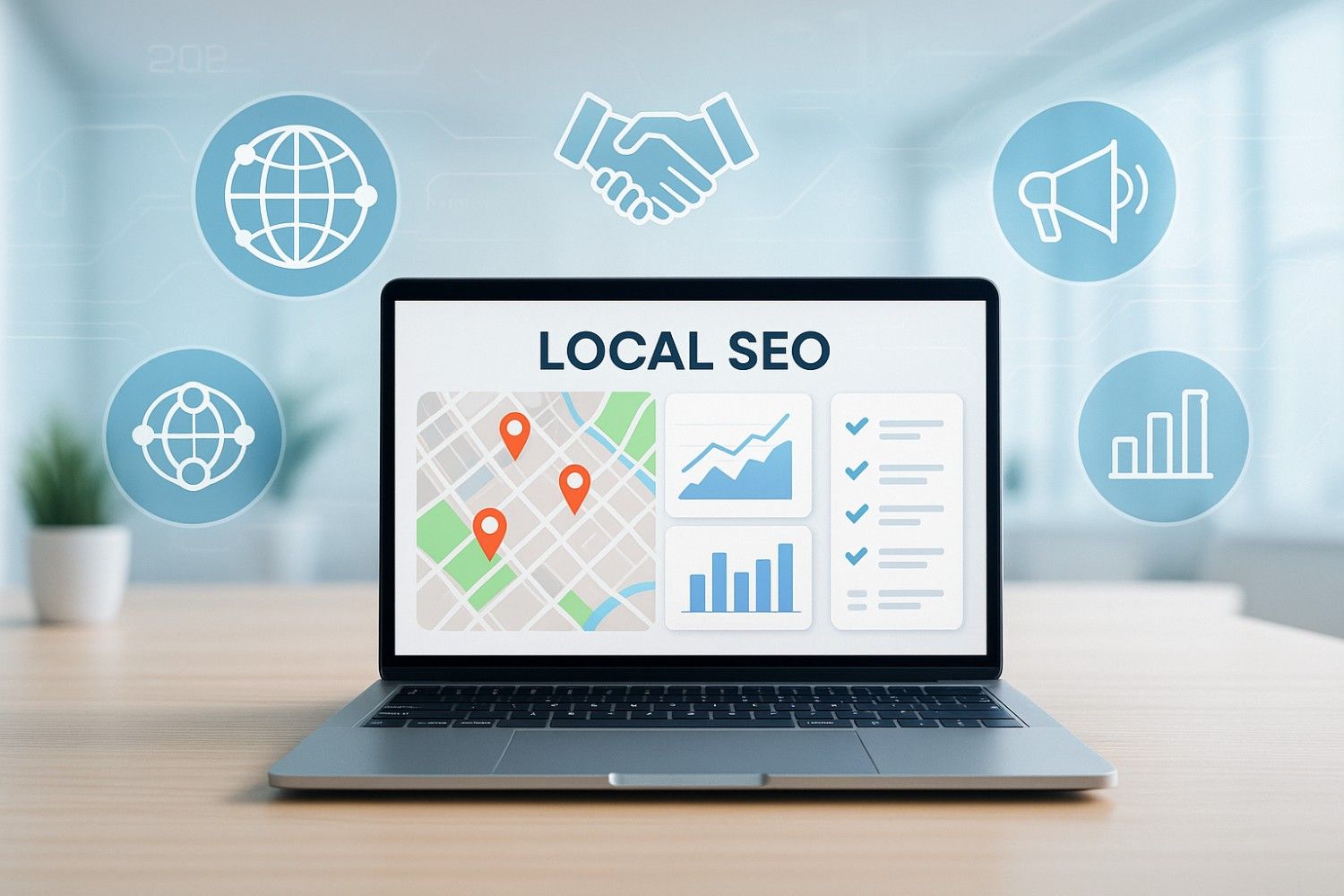Search Engine Optimization (SEO) is a powerful tool for startups to boost visibility, drive traffic, and grow online. But let’s face it – with a tight budget, SEO can feel out of reach. The good news? Effective SEO doesn’t have to cost a fortune.
This guide shows you how to use affordable strategies, free tools, and budget-friendly tactics to compete with the big players. Think of it as your roadmap to cost-effective SEO, built for new entrepreneurs.
What we’ll cover:
- SEO basics every startup needs
- Low-cost tactics you can try today
- The best free tools to maximize results
- When to invest in professional SEO services
By the end, you’ll have actionable tips to grow your startup’s online presence without overspending.
Understanding SEO Basics
Before we jump into the nitty-gritty, it’s crucial to understand the foundations of SEO. Think of this as building a strong base for your online growth. Here’s a breakdown of the three main pillars of SEO every startup should know.
Keyword Research for Startups
Keywords are the foundation of SEO. These are the search terms your target audience types into Google when they’re looking for products or content like yours. For startups, keyword research is a budget-friendly way to align your website with the needs of your audience.
Tip: Start with “long-tail keywords.” These are longer, more specific search terms like best sneakers for city running instead of just sneakers. They’re less competitive and have higher conversion potential.
Tools like Google Keyword Planner and Ubersuggest can help you discover relevant keywords without a hefty price tag.
On-Page Optimization Techniques
On-page SEO refers to optimizing elements within your website to improve its search engine ranking. This includes:
Creating compelling meta titles and descriptions that include your target keywords to help improve click-through rates and search engine visibility.
Using proper header tags (H1, H2, H3) to structure your content logically, making it easier for both users and search engines to navigate and understand.
Optimizing images by compressing file sizes to improve site loading speed and adding descriptive “alt text” to enhance accessibility and boost SEO.
Adding internal links to guide visitors to other valuable content on your website, encouraging them to stay longer and explore more of what you offer.
Off-Page Optimization Strategies
Off-page SEO plays a key role in building your website’s authority, trustworthiness, and overall reputation in the online world. It focuses on activities that happen outside your website but still impact your rankings. The most common off-page strategy is link building where other reputable websites link back to yours, signaling to search engines that your content is credible and useful. ,
To get started, consider collaborating with fellow startups, exchanging links, or writing guest blog posts for niche communities related to your industry. These partnerships can help you grow your audience while boosting your authority. Don’t overlook the power of social shares encouraging people to share your content on platforms like Twitter, LinkedIn, or Facebook can drive more traffic to your site.
Similarly, PR mentions from industry leaders or publications can strengthen your brand visibility. Participating in relevant online forums and discussions also allows you to build relationships, establish expertise, and increase organic visibility. By diversifying your off-page SEO efforts, you can create a well-rounded strategy that supports long-term growth.
Affordable SEO Tactics for Startups
If hiring a professional SEO agency isn’t in the cards yet, that’s perfectly fine. There are several low-cost strategies you can implement right now.
Content Marketing on a Budget
They say “content is king” for a reason and they’re absolutely right. Well-written, engaging content does more than just fill up space on your website. It helps you rank higher in search engine results, keeps visitors on your site longer, and builds trust with your audience. Quality content is a powerful way to establish your authority in your industry.
One of the best ways to create valuable content is by starting a blog that addresses the real interests and needs of your target audience. For example:
- If you sell eco-friendly cleaning products, you could write articles like 5 DIY Cleaning Hacks for a Sustainable Home or The Ultimate Guide to Non-Toxic Cleaning.
- Share tips, tricks, and insights that resonate with your audience while demonstrating how your products fit into their lifestyle.
Make sure to incorporate your keywords naturally into your blog posts, FAQs, and product descriptions. This not only improves SEO but also ensures your content feels authentic and relevant rather than forced or overly promotional.
Consistency is key to building a loyal audience and improving your SEO rankings. Aim to publish fresh, high-quality content at least once or twice a month and stick to your schedule. Over time, this consistent effort will pay off, driving more traffic to your site and helping your business grow.
Using Social Media for SEO
Social media platforms can indirectly boost your SEO by driving traffic to your website and increasing brand visibility.
- Share links to your blog posts or landing pages on social platforms where your audience hangs out (e.g., Instagram, LinkedIn).
- Use relevant hashtags and collaborate with micro-influencers in your niche.
- Engage with followers through comments or polls to build a loyal community.
Local SEO for Startups
If your startup serves a local audience, it’s essential to ensure they can find you quickly and easily online. Visibility in local search results can significantly drive foot traffic and boost your business.
- Start by listing your business on platforms like Google My Business, Yelp, and other local directories relevant to your area or industry. These listings help your business show up in local searches and provide essential information like your address, phone number, and operating hours.
- Use location-based keywords in your website content, such as New York artisanal coffee shop or Los Angeles vegan bakery. This helps search engines understand where your business is located and what you offer.
- Ask your customers to leave reviews on platforms like Google or Yelp. Not only do reviews improve your visibility in local listings, but they also build trust and credibility with potential customers who are researching your business.
By optimizing for local search, you make it easier for customers in your area to find and choose your business.
Best Free SEO Tools for Startups
Why pay for SEO tools when so many great ones are free? These tools can help you analyze and optimize your website effectively without straining your budget, making them perfect for small businesses, startups, or anyone just getting started in the world of SEO.
Google Analytics and Search Console
Both of these tools are must-haves for monitoring and improving your website’s performance. They provide valuable insights that help you make data-driven decisions.
- Google Analytics is your go-to for understanding how visitors interact with your website. It tracks key metrics like traffic sources, bounce rates, user behavior, and even the most popular pages. With this information, you can identify what’s working and what needs improvement.
- Google Search Console focuses on your website’s visibility in search results. It shows the keywords you’re ranking for, how users find your site, and flags any technical issues like crawl errors or mobile usability problems. It’s a vital tool for maintaining your site’s health and improving its search engine presence.
Free Keyword Research Tools
Finding the right keywords is essential for driving targeted traffic to your website. These free tools make keyword research accessible to everyone:
- Ubersuggest offers detailed insights into long-tail keywords, search volume, competition, and even provides recommendations for related content ideas. It’s an excellent tool for planning blog posts, SEO campaigns, or content strategies.
- AnswerThePublic helps you uncover the specific questions, topics, and concerns your target audience is searching for online. By addressing these questions through your content, you can create articles and resources that directly meet your audience’s needs, helping you rank higher in search engines.
These free tools are powerful resources that can give you a competitive edge without the need for expensive software. Whether you’re an experienced marketer or a beginner, they’ll help you achieve your SEO goals effectively and efficiently.
Website Analysis Tools
- Yoast SEO (for WordPress users) offers on-page optimization tips for blog posts and pages.
- PageSpeed Insights by Google checks your website’s loading speed and suggests fixes.
Knowing When to Invest in Paid SEO Services
No matter how committed you are to DIY SEO, there might come a point when it makes sense to hire professional help.
Signs You Need a Professional SEO Agency
- Your website traffic has plateaued despite your consistent efforts to optimize content, improve technical SEO, and enhance user experience. It feels like you’ve hit a ceiling, and you’re unsure how to break through.
- You lack the time, resources, or specialized expertise to dive into advanced SEO techniques like keyword research, content clustering, or backlink strategies, leaving you struggling to keep up with competitors.
- You’re gearing up to launch a major new product or service and need a strong SEO strategy to gain a competitive edge, attract attention, and drive meaningful traffic to ensure a successful launch.
Ready to Outsource Your SEO the Right Way?
Tired of guesswork and unreliable freelancers? Partner with experts who understand your goals. Our outsourced SEO services are built around transparency, performance, and long-term growth.
Tips for Choosing the Right SEO Agency
When choosing a partner, look for:
- Transparent pricing and clearly defined deliverables, so you know exactly what you’re paying for and what to expect at every step of the project.
- A proven track record backed by successful case studies and glowing client testimonials, demonstrating reliability and expertise.
- Specialization in your industry or niche, ensuring a deep understanding of your specific needs and the ability to deliver tailored solutions.
It’s also worth asking for a detailed SEO audit to better understand what they can improve on your site.
Key Takeaways
- Affordable SEO is Possible: Startups can adopt budget-friendly SEO strategies without compromising on results.
- Use Free Tools: Take advantage of free or low-cost tools to analyze, optimize, and track your website’s performance.
- Content is King: High-quality, relevant content tailored to your audience significantly enhances your SEO efforts.
- Target Long-Tail Keywords: Focus on niche-specific, long-tail keywords to rank higher in search results with less competition.
- Consistency is Key: Regular updates, optimization, and monitoring are essential for sustainable SEO success.
- Outsmart Competitors: With creativity and smarts, startups can compete effectively, even against bigger players in the industry.




